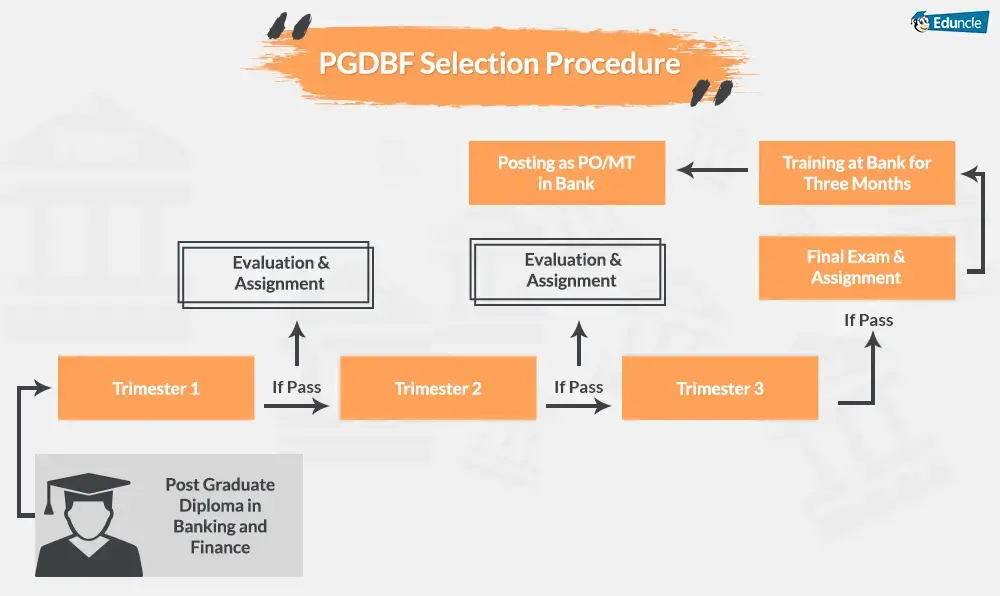
A Post Graduate Diploma in Banking and Finance (PGDBF) is a 1-year diploma course, which provides candidates the knowledge of banking and finance and helps them to build up their managerial and technical skills.
Here, in this article candidates will be provided with the complete details related to PGDBF course.
Most popular PGDBF programmes are offered by Baroda Manipal School of Banking (under the Manipal University), Amity University, Indian Bank Manipal School of Banking (IBMSB) and other institutes.
Enlisted below are the banks that offer this course for the recruitment of Probationary Officer/Sales Officer/Credit Officer posts:
ICICI
HDFC
IDBI
Andhra Bank
Indian Bank
Among the above-mentioned courses BOB PGDBF, Syndicate Bank PGDBF & IDBI PGDBF courses are the top-most recruitment exams for the job opening in PSB banks. Most of these nationalized banks have tie up with top universities for the PGDBF courses.
In this course, a candidate goes through 9 months (3 trimesters) of studying at the Campus & 2-3 months of internship/ training at bank’s branches.
But before applying for this course, candidates must know the eligibility criteria to pursue Post Graduate Diploma in Banking and Finance.
Who is Eligible for PGDBF Course?
Before applying for this course, candidates must check whether they are eligible to pursue PGDBF programme or not.
PGDBF programme is for the recruitment of Bank officers & hence its eligibility criteria is very similar to that of a Bank PO.
Candidates must satisfy the eligibility criteria to pursue the course in respect to the three aspects that are nationality, educational qualification, and age limit.
Nationality
A candidate must be either-
i) A Citizen of India or
ii) A Subject of Nepal or
iii) A Subject of Bhutan or
iv) A Tibetan refugee who came over to India before 1st January 1962 with the intention of permanently settling in India or
v) A person of Indian origin who has migrated from Pakistan, Burma, Sri Lanka, East African Countries of Kenya, Uganda, the United Republic of Tanzania (formerly Tanganyika and Zanzibar), Zambia, Malawi, Zaire, Ethiopia and Vietnam with the intention of permanently settling in India.
Educational Qualification
Candidates who want to pursue Post Graduate Diploma in Banking and Finance must have a Graduation degree with minimum 60% marks for General and OBC Categories and minimum 55% marks for SC/ST/PWD categories in any discipline from a recognized University Or any equivalent qualification as such recognized by the Central Government.
Candidate should indicate the percentage obtained in Graduation, calculated to the nearest two decimals in the online application. The fraction of percentage will be ignored i.e. 59.99% will be treated as less than 60% and 54.99% will be treated as less than 55%.
Candidates who are in their final year/semester of their Graduation may also apply and if called for an interview, they will have to produce the proof of having passed the graduation examination.
Candidates should also have proficiency in computers.
Age Limit (As on 01.04.2019)
A candidate must have been born not earlier than 2nd April 1991 and not later than 1st April 1999 (both dates inclusive) i.e. the minimum age limit is 20 years and the maximum age limit is 28 years.
Relaxation of Upper Age Limit:
| S.No. | Category | Age Relaxation |
| A | Scheduled Caste/ Scheduled Tribe candidates | 5 years |
| B | Other Backward Classes (Non-Creamy Layer) candidates | 3 years |
| C | Ex-Servicemen and Commissioned Officers including ECOs/ SSCOs who have rendered at least 5 years military service and have been released on completion of assignment. | 5 years for selection through written test & interview, subject to ceiling, as per Govt. Guidelines |
| D | All persons who have ordinarily been domiciled in J & K State during 01.01.1980 and 31.12.1989 | 5 years |
| E | Persons affected by 1984 riots | 5 years |
| F | Persons with Disabilities (PWD) | PWD (SC-ST) - 15 yearsPWD (OBC) - 13 years PWD (Gen) - 10 years |
Note: Ex-Servicemen whose assignment is due to be completed within the next one year from the last date for receipt of application can also apply.
However, dismissal or discharge of misconduct or inefficiency or on account of physical disability attributable to military service is invalid.
Which are the Best Institutes in India for Post Graduate Diploma in Banking and Finance?
TKWs Institute of Banking and Finance
SIES College of Management Studies (SIESCOMS)
Maharaja Sayajirao University, Baroda
Pune University
Amity University
Manipal University
NIIT
What is the Selection Procedure for PGDBF?
Post Graduate Diploma in Banking & Finance is known as the future of the banking recruitment. All the pioneer banks are switching to this diploma course to recruit skilled employees.
For selection in PGDBF Course, a candidate must appear in an online test. If candidate qualifies the test, he/she will face the Group Discussion round.
After clearing the GD round, the candidates will be called for Personal Interview.

Complete details regarding online test is given in the table below:
| Type | SL | Name of the Test | No of Question | Max. Marks | Time |
| Objective Test | 1 | Reasoning | 50 | 50 | 2 Hour |
| 2 | Quantitative | 50 | 50 | ||
| 3 | General Awareness (related to Banking Industry) | 50 | 50 | ||
| 4 | English Language | 50 | 50 | ||
| Descriptive Test | 5 | English Language | 02 | 50 | 30 Minutes |
PGDBF Course Fee – Education Loan & Payment Process
The PGDBF course details & fee varies widely. Candidates need to pay around Rs. 3.45 lakh to Rs. 3.99 lakh plus service taxes, as applicable, in fixed instalments during the 1-year programme (inclusive of course fees, lodging, boarding and other fees, etc.).
Candidates can also pay the Post Graduate Diploma in Banking and Finance Course Fees by availing Education Loan granted by Bank of Baroda at a concessional rate of interest, which is 8%. In most cases, the bank recruiting through PGDBF provide loan for PGDBF course fee under Educational Loan scheme.
Apart from exam fees, there are various certification courses during the PGDBF training like NISM Mutual Fund & Depository Operations. The fee for these exams is Rs. 2500/-.
Candidate needs to clear these certification courses as a part of Post Graduate Diploma in Banking and Finance Course.
Stipend During the Training
During the training period of 9 months, the candidates will be paid Rs. 2500/- per month and for the remaining 3 months training period, they will be paid Rs. 10000/- per month.
PGDBF Syllabus for All Trimesters
PGDBF follows trimester pattern. Candidates who will be pursuing Post Graduate Diploma in Banking and Finance must be looking for the syllabus and many of the candidates must have a question in their mind like:
Which are the toughest subjects in PGDBF course?
Most of the toughest subjects in Post Graduate Diploma in Banking and Finance Course are in 2nd & 3rd trimesters. The course is designed in a way to maintain a bliss point of tough & relatively easier topics & subjects in every semester.
So, below we have provided the complete list of subjects for each trimester that a candidate will study in their PGDBF programme.
Trimester: I (15 Weeks)
Principles of Management
Macro-Economic Principles in Banking & Finance
Banking Operations
Banking regulations & legal aspects
Marketing Management in Banks
Retail Banking
Capital markets & Financial services
Trimester: II (15 Weeks)
Organizational behavior & people management
Service products, Cash management & Cross selling
Insurance products: Marketing/Operations
Wealth management
Mutual funds
SME & Agricultural financing /Macro credit
Corporate credit including Project finance
Security analysis & portfolio management
Trimester: III (15 Weeks)
NPA Management
Treasury management
Derivatives & Risk management (including commodity derivatives)
International Banking & Forex management
Technology applications in banking
Valuation techniques
Strategic management
Pros and Cons of PGDBF Course
Pros:
The training provided to the candidates will be through the world class faculty.
The entire course fee will be refunded through the Loyalty Bonus only if the selected candidate will work in that bank for 5 years.
After successful completion of PG Diploma in Banking and Finance, the candidates will be awarded with JMGS scale-1 post.
Candidates can avail Education Loan to pay PGDBF course fee.
Cons:
There is a bond period of 2-5 years in different recruiting organizations. Young candidates who want to explore more opportunities may feel tethered due to the bond.
If candidate breaks the bond, he/she will have to pay their education loan in a single installment at a commercial rate of interest. He shall pay back the stipend paid to him during training as well.
In case of education loan, candidates will have to pay the EMI’s which will be deducted from their salary.
As banks will increase the recruitment for various posts in the coming years, this course will be beneficial for the candidates who failed to clear IBPS/SBI Exams.
This course is easy so candidates have a great opportunity to work in a bank through this course while putting less effort in clearing the exam.
Aspiring bankers can find the Official link of popular PGDBF Courses below:
In this blog we have covered every single detail regarding PGDBF Course. If you have any queries/doubts regarding this blog, you can ask them in the comment section given below.


















